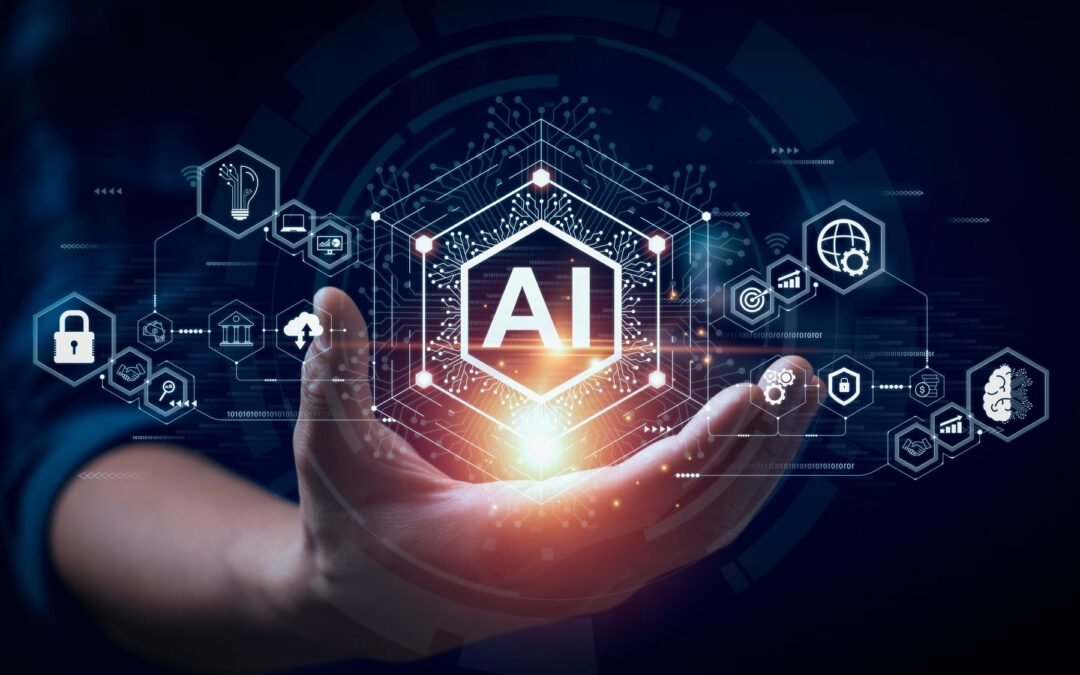
Generative AI is a type of Artificial Intelligence machine learning with the primary goal of learning and analyzing patterns and structures of input information to “generate” – creating outputs of all varieties from written information and formulaic solutions to creative imagery, video, and other media content. A significantly simpler form of Generative AI has been around since the 1960s, however newer consumer-facing AI applications introduced in our digital age fuels Generative AI’s learning potential. Like the age of the internet, we’re seeing a fundamental shift in the way people will create, work, and perform in the AI-driven age we are entering. Here are 5 key takeaways based on our current exposure to AI to keep in mind as the adoption and integration of AI continues to grow.
1: Generative AI has and will continue to impact every industry, every interactive application, everywhere, and it’s not a bad thing.
There’s no escaping it. As the internet and computer ages reshaped the working and creative landscapes across every industry, so too will/does AI. The effects are already being felt with AI tools, integrations, and standalone applications appearing in everything we interact with. Some aversion to new integrations and tools is normal, however as a world culture, we now interact, consume, and work with technology every minute of our day, in one form or another. You walk around every day with a mobile device that has more than 100,000 times the processing power of the computer that landed man on the moon 50 years ago. Such a device would’ve faced incredible opposition at the time. And let’s not forget that less than 20 years ago, news and media outlets had special guests to explain what e-mail was and how it worked! Today, using email is a natural, efficient part of our daily communication methods without question.
The point here is that some opposition to new things is natural, and such hesitation to accept Generative AI’s role in day-to-day life operations will pass from novel to adopted quickly.
2. The internet-dependent and technologically-dependent consumer global tech dependency will fuel Generative AI’s learning potential.
Generative AI’s growth pace and potential is dependent on information that is feeding it. 25 years ago, the online population wasn’t at a critical mass to feed Generative AI enough information to grow at the pace it can today. Coupled with the hyper-interconnected infrastructure of every application to the internet, it has presented the perfect scenario for AI to truly flourish, and quickly.
3: As Generative AI continues to “create,” the legal implications surrounding copyright, IP rights, and responsible AI use will be ever evolving.
Copyright and IP law is not a new issue. Ever since the invention of the printing press in the 15th century, concerns and policies surrounding the integrity of copyright have evolved to adapt to the new circumstances, and in some situations, policy has evolved to govern the transfer of copyright from one medium to another. New technologies provide new tools for creative expression and new vehicles for sharing those works. But sometimes they also disrupt existing copyright regimes—as seen with player pianos (late 1800s), radio (1920s and 1930s), cable television (1960s and 1970s), photocopying (1970s), home video cassette recorders (1970s and 1980s), and, of course, digital downloading and streaming technology (today). Copyright has had to evolve accordingly and will continue to with the advent of AI. Fortunately the same AI applications that can infringe on established copyright and IP policies can also be adapted to monitor and reinforce those policies. – source
4: Generative AI is creating a dependency on tech, improving creative, professional, and business efficiency, rather than replacing individuals and tasks.
This is a big point of concern across every community and industry–will AI replace me, my art, my profession, or my trade. Again, this isn’t a new concern. Invention propagates concern of a previous practice becoming obsolete. Before the printing press was invented in 1439, scribes were tasked with manually recording and writing books, manuscripts, and other materials. Almost 600 years later, our world is entirely different. Many manual, human-driven tasks have been partially or entirely replaced as technologies have created better, faster, and overall more efficient methods. These concerns are only partially applicable to Generative AI. Generative AI doesn’t truly work independent from a system of integration, meaning that it has to integrate with a software, application, tool, or system to be truly effective. These systems require human guidance, maintenance, and development to. – source
5: Like the age of the internet, the age of Generative AI presents potential security vulnerabilities. Vigilant, responsible use of and exposure to Generative AI is paramount.
Technology is littered with scam methods, whether by phone, email, malware, or phishing, and AI is no different. Naturally, Generative AI will create new and unforeseen risks and challenges, such as scams to probe and gather sensitive information or cybersecurity breaches, which will require technologies not yet available to combat these new threats. This will create a new age of cybersecurity using Generative AI to combat threats. Consumer education, awareness and vigilance is an ongoing and ever-growing importance. However, the same Generative AI technology that scammers use may also be adapted to combat them. It’s a tool, a programmed and tailored technology to serve a purpose.
Generative AI and IP.com
AI is here–it’s proliferating and permeating every interactive application and system we use. IP.com is no different, integrating Generative AI into our industry-leading software and services to optimize and elevate the workflow efficiency of our client’s problem solving and ideation workflows.






